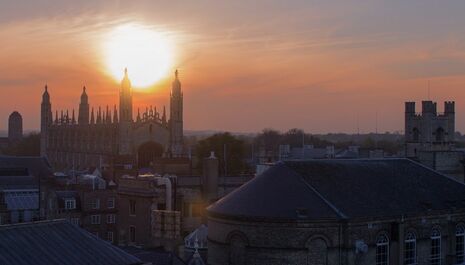Cambridge: a view from the outside
In her first piece this term, returning columnist Millie Paine explores the disjunction between rumour and reality when it comes to popular opinion about Cambridge.

With May Week a distant, albeit glittering, memory, the vast majority of us will be readying ourselves for another term of blood, sweat and Cindies. The reality of Cambridge, which in mid-July had seemed so far away, is finally setting in again. I’d almost forgotten what is was like to longingly glance at John’s while cycling down the hill from Fitz on my way to a 9am lecture, or to experience caffeine-induced heart palpitations whilst trying to fuel a 12 hour overnight library stint at the mercy of an impending essay deadline. I say almost, because Cambridge seems to be ever-present in my mind, a constant I might momentarily forget, but from which I cannot seem to escape.
It’s also impossible to escape the extensive coverage given to institutions such as Cambridge and Oxford across all forms of media. Whether it’s the majestic, towering spires and elegant formals that seem to define the Instagram accounts of Caroline Calloway and “Cambridge is Possible”, or the damning articles regarding the “Oxbridge political elite”, it seems that we have a general obsession with painting Oxbridge as something untouchably fantastical, and almost enigmatic. Sure, it makes for interesting reading, but by making these institutions seem both fairytale and socially backward, we only hinder access for those less privileged in society.
By exaggerating the classism, elitism and nepotism that goes on at Cambridge (which, college depending, is really not as terrible as you might think), any classism and elitism that Cambridge actually embodies is perpetuated by discouraging people from applying. And the kind of people that wouldn’t apply because they’re worried that Oxbridge is reserved for powerful posh people with lots of money are exactly the type of people that we need as graduates to try to reverse exactly that stereotype. Not only could this put off some of the best applicants, who have managed to achieve the grades required without the leg-up provided by the smaller classes and superior resources of private and grammar schools, but it also paints an inaccurate and unfair picture of the university itself as socially backwards. Oxbridge does have links with inequality, but, nowadays at least, it is the symptom, not the cause.
Undeniably, top universities are elitist, and this, in some form, is expected. After all, if there are only a limited number of places at a desirable institution, then they will be forced to select the best applicants. On paper, this rigorous selection is limited to academic ability only. Unfortunately, however, this leads to a disproportionate amount of privately educated students: whilst only around 7 per cent of the country are privately educated, around 38 per cent of students at Cambridge attended private school.
Obviously it isn’t the case that rich people are smarter and more deserving; we ought to be past that kind of falsely applied social Darwinism. With more money being put into their education, along with teachers who mostly went to the top universities and therefore have inside knowledge, privately educated students are in a better position to fulfil the entry criteria. There is something fundamentally wrong with this, and of course these universities should be called out if a lack of access perpetuates the problem. But often, this is a problem of institutionalised inequality that is bigger than Oxford and Cambridge, and pointing the finger at them does nothing to help.
Even publications that tend not to concern themselves with systematic inequality seem to have jumped on the Oxbridge-bashing bandwagon: articles condemning students for enjoying a day of drinking on Jesus Green on Caesarian Sunday, or about supposedly sexist and elitist drinking societies are regular features in media outlets such as the Daily Mail. Why is it that the booze-soaked traditions of Oxbridge are more talked about than the ketamine problem in Manchester, for example? Cambridge ‘toffs’ are lambasted for this day of drinking more than students at other universities, largely because of the perception of them as posh and privileged. This further alienates potential applicants, purely because they can’t see themselves as being part of a group that wears matching ties and blazers, when in reality this is much the same thing as many of the sports teams and societies at other universities.
The portrayal of Cambridge in the media is often very far removed from the reality. The vast majority of students are totally normal, and whilst we are privileged to be here, our connection to the university does not make us any better or any more likely to succeed than if we were at any other institution. Once you’re here, the grandiose architecture and stuffy traditions really do fade in to the background. Claiming that the political and financial elite are all Oxbridge graduates is a self-fulfilling prophecy. Only by painting a more realistic picture of these universities in the media, can we ever break the stereotype that Oxbridge is unattainable for anybody who didn’t go to a school with a Latin motto.
 News / SU reluctantly registers controversial women’s soc18 December 2025
News / SU reluctantly registers controversial women’s soc18 December 2025 News / CUP announces funding scheme for under-represented academics19 December 2025
News / CUP announces funding scheme for under-represented academics19 December 2025 Features / Should I stay or should I go? Cambridge students and alumni reflect on how their memories stay with them15 December 2025
Features / Should I stay or should I go? Cambridge students and alumni reflect on how their memories stay with them15 December 2025 Fashion / The art of the formal outfit 18 December 2025
Fashion / The art of the formal outfit 18 December 2025 Lifestyle / Summer lovin’ had me so… lonely?18 December 2025
Lifestyle / Summer lovin’ had me so… lonely?18 December 2025









